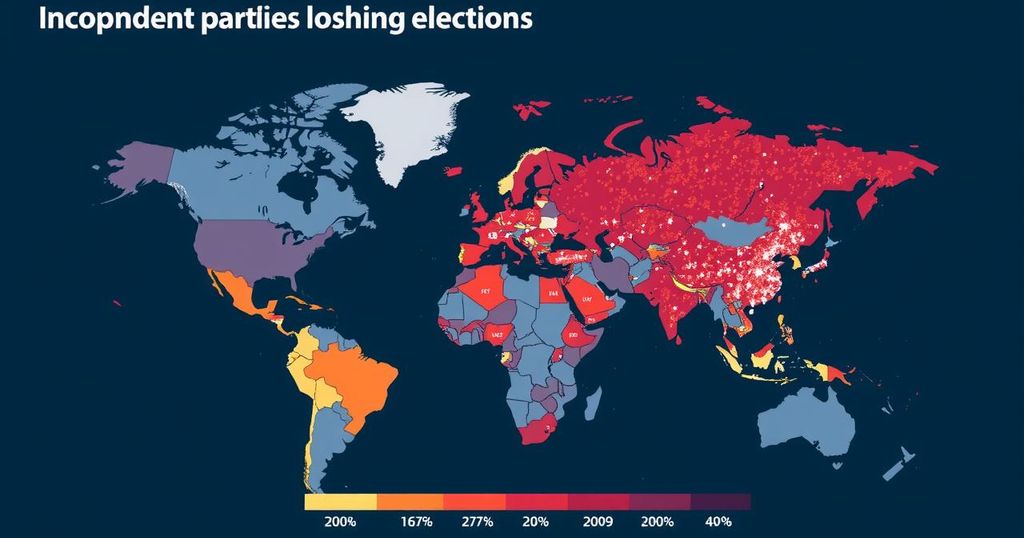Incumbent parties globally have faced historic electoral losses amid rising voter dissatisfaction, including the Democratic Party in the U.S. Despite some losses, Democrats performed relatively well compared to other nations, largely due to a comparatively strong economy. Key issues such as inflation overshadowed economic growth, underpinning voters’ desire for change. Future elections may present opportunities for the Democrats, as they will not be defending an incumbency.
In the aftermath of recent elections worldwide, the Democratic Party’s performance reflects broader trends impacting incumbent parties globally. Many incumbent governments faced significant setbacks, losing votes and seats in a manner that aligns with increasing voter dissatisfaction towards their leadership. Despite Vice President Kamala Harris’s narrow defeats in key states, the Democrats’ losses were comparatively modest against the backdrop of historical defeats faced by incumbent parties in other democracies. Election analyses post-2024 indicate record voter turnout, revealing global discontentment with ruling parties. Significant losses were recorded across various democracies, with over 80 percent of incumbent parties either losing seats or experiencing reduced vote shares. Countries such as Japan, Botswana, and South Africa saw longstanding ruling parties lose their dominant positions, indicating a shift in political landscapes across the globe. The recent election outcomes in Senegal, Sri Lanka, and 14 nations in Europe further highlighted voters’ readiness to unseat incumbents. Comparably, the Democrats managed to maintain relative stability, exhibiting one of the least detrimental losses among incumbent parties in developed nations. Contributing factors to this phenomenon include the relative robustness of the U.S. economy, particularly in contrast to the challenges faced by other nations. However, prevailing issues like rising inflation and housing costs remained central to voters’ concerns, overshadowing positive economic indicators. To a certain extent, victories for some incumbent parties stemmed from a focus on national security concerns, as was evident in recent elections in Mexico, Finland, Moldova, and the Dominican Republic. Unlike these countries, U.S. campaigns did not prominently feature national security narratives, apart from border control and immigration discussions. Thus, the Democratic Party’s challenges reflect an unsettling desire among voters for change rather than a clear endorsement of their policies. While the Democratic Party’s outcomes were not as disastrous as those in other nations, they were still significantly influenced by prevailing economic anxiety and a general discontent with governance. If existing trends persist, the next electoral cycle may present the Democrats with an opportunity to reclaim initiative, as they will no longer be the incumbents to defend. This year’s global electoral outcomes have underscored a substantial wave of dissatisfaction toward incumbents, firmly placing the recent U.S. elections within a broader international context.
Recent electoral cycles have exposed a growing wave of voter discontent directed towards incumbent parties across democracies worldwide. This dissatisfaction is likely rooted in socio-economic challenges faced following the COVID-19 pandemic. In such a climate, the performance of specific political campaigns, such as that of Vice President Kamala Harris and the Democratic Party, can be evaluated not only in terms of local issues but also through a comparative lens against global electoral trends. The pattern of rising opposition victories indicates a potential realignment of political power in favor of challengers, fueled by a general sense of frustration among the electorate.
The Democratic Party’s modest electoral losses reflect a broader trend of discontent experienced by incumbents globally. While the U.S. economy shows signs of relative strength, key issues like inflation overshadow positive indicators. The wave of electoral defeats for incumbents across the globe reveals a significant shift in voter sentiment, signaling potential challenges for governing parties moving forward. The Democratic Party may benefit from these trends in future elections, assuming the role of challengers rather than incumbents.
Original Source: abcnews.go.com






